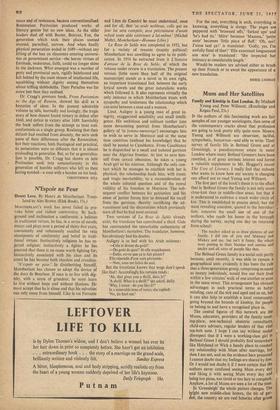N'Espoir ne Peur
MONTHERLANT'S work has never failed to pro- voke bitter and violent controversy. By badk- ground and inclination a conformist, a believer in traditional virtues, he has, in a series of novels, essays and plays over a period of thirty-five years, consistently and vehemently assailed the twin standpoints of conformity and belief in tradi- tional virtues. Instinctively religious he has re- jected religion; instinctively a fighter he has asserted that there is no cause worth fighting for; Instinctively associated with his class and its creed he has become both classless and creedless.
'N'espoir ne peur.' In disinheriting himself, Montherlant has chosen to adopt the device of the ducs de Bourbon. If man is to live with dig- nity, with a sense of grandeur, he must learn o live without hope and without illusions. He must accept that he is alone and that his salvation can only come from himself. Like le roi Ferrante
and Lon de Coantre he must understand, once and for all, that `sa settle noblesse, celle qui un jour lui sera cotnptee, sera precisement d'avoir refuse toute aide etterieure a Itti-miltne.' (Michel Mohrt, Montherlant—Homme Libre.) La Rose de Sable was completed in 1932, but for a variety of reasons (ma,inly political) Montherlant was unwilling to agree to its publi- cation. In 1954 he extracted from it L'histoire d'amour de la Rose de Sable, of which the volume under review is a translation. The present version (little more than half of the original manuscript) stands as a novel in its own right, an important transitional link between the early lyrical novels and the great naturalistic works which followed it. It also represents virtually the only instance in which Montherlant treats with sympathy and tenderness the relationship which can exist between a man and a woman.
Lieut. Auligny is a young man of great in- tegrity, exaggerated sensibility and small intelli- gence. His ambitious and militant mother (one more devastating portrait from Montherlant's gallery of `la femme-mensonge') encourages him to wish to serve in Morocco and at the same time contrives (without his knowledge) that he shall be posted to Casablanca. From Casablanca he is dispatched to a small and isolated garrison near the Algerian frontier. At last, to save him- self from sexual obsession, he takes a young Arab girl as his mistress. Although the only con- tact which he manages to establish with her is physical, the relationship leads him, with ironic and tragic inevitability, to a reconsideration of the whole colonial question and of the moral validity of his function in Morocco. The sub- sequent conflict between his patriotism and his sense of justice forces him to demand his recall from the garrison, thereby sacrificing the ad- vancement and the decorations which previously were all that he had most coveted.
Two versions of La Rose de Sable already exist; the translator has contributed a third. Gide has commended the remarkable authenticity of Montherlant's narrative. The translator, however, has obviously had his doubts.
Auligny is in bed with his Arab mistress : ---Cela te donne du gat?
—Du goat de quoi? fit-elle stupidement.
—Enfin, est-ce que ca te fait plaisir?
Elle rdpondit d'une voix pitoyable : —Non, vous me faites du mal.
But the translator knows that wogs don't speak like that ! Accordingly his version reads : `Ah, that gives you a thrill, does it?'
'A shrill. What is a shrill?' she asked, dully.
'Why, I mean : do you like it?'
In a miserable tone of voice, she replied : `No, zis hurt me.'
For the rest, everything is arch, everything is knowing, everything is slangy. The pages arc peppered with 'browned offs,' forked ups' and `he's had its.' Mere' becomes 'Mamma,' petite amie' becomes `little piece of fluff."Oh, oui J'aime tant ca!' is translated : 'Golly, yes, I'm awfully fond of that ! "Elle examinait longuement son sexe' is translated : `She inspected her intimacy at considerable length.'
Would-be readers are advised either to brush up their French or to await the appearance of a new translation.
DEREK LINDSA1


































 Previous page
Previous page